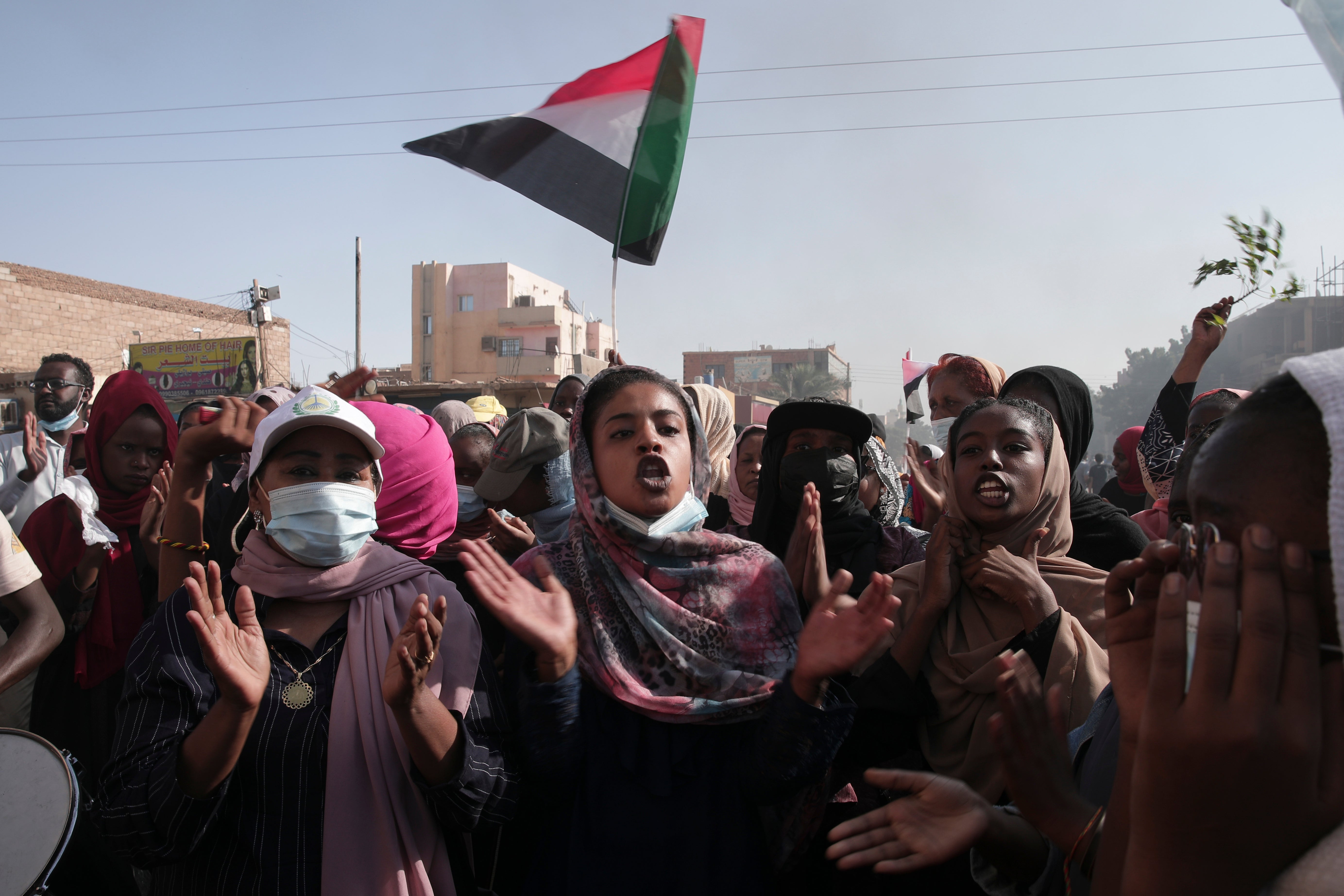Sudan deal risks pushing the military’s pro-democracy rivals into irrelevance
A compromise is needed to avoid bleak scenarios in Sudan, but it’s hard to see the military letting go of power soon, writes Ahmed Aboudouh


The reinstatement of Abdalla Hamdok as Sudan’s prime minister after last month’s military coup may represent a loosening of the army’s grip on power, but the country’s transition to democracy hangs in the balance with further turmoil likely.
Hamdok was placed under house arrest after the 25 October coup - led by General Abdel Fattah al-Burhan - but released on Sunday under a deal struck with the military, which followed pressure from the US and UN, among others, as well as unrest on the streets - where there were further protests on Thursday.
Along with giving in to international pressure to end Hamdok’s house arrest and releasing all political detainees, the deal recognises the constitutional arrangement signed in 2019 after the ousting of longtime dictator Omar al-Bashir and the Juba peace deal with some of the armed groups that led the civil war against his regime.
But it stops short of addressing much of the remaining underlying questions that will determine Sudan’s future - and those shortcomings could be fatal for the remainder of the transitional period.
Ongoing street protests complain about a lack of a forward-looking vision on solving the military and security forces’ role in politics, their parts in crimes committed under al-Bashir as well as the future of power sharing and building democratic institutions.
A long standoff between the military and the civilians might result in state fragmentation and wider unrest.
“The deal is merely a window opportunity towards a new era, but it will not be the recipe to Sudan’s survival from the future’s bleak scenarios,” said Osman Mirghani, a Khartoum-based veteran journalist and independent analyst.
“The real test for the country’s rulers is the commitment to building the state institutions because until now Sudan has none,” he adds.
Merghani places great emphasis on Sudan’s need for a democratically elected parliament, a process that for now seems elusive.
Some protesters see the deal as a “betrayal” by Hamdok, who they accuse of being a new civilian front for the military’s dirty dealings. To appease the crowds, his office said on Wednesday he will review appointments and dismissals made by the military to key state posts.
The reality, however, is that the deal leaves both sides in a precarious position.
One of the main sources of friction has been the Sovereign Council, the country’s highest office. Some in the Forces of Freedom and Change (FFC) - the civilian body underwriting the political transition with the military - insisted one of its members head the council as is required by the 2019 power sharing deal.
The coup, however, has ended that debate, with Gen Burhan reinstalled as head of the council until the general election due in 2023.
“The agreement legitimises the predominant role of the military in Sudan’s political life,” Alex de Waal, an expert on Sudan at Tufts University, told The Independent. “Al-Burhan’s takeover was unsustainable, and he needed a face-saving way of backing down, but what he got was a lot more than that, only minor concessions from Hamdok.”
The generals major fear over the partnership with the democracy-leaning civilians is being held accountable for crimes before and after al-Bashir’s fall. But more so the potential loss of their grip on lucrative contracts in the agricultural, industrial and gold mining sectors, giving the military the upper hand in controlling Sudan’s overall economy.
Aware of the military’s kleptocratic rule, some grassroots activists in the local Resistance Committees, which have also played a key role in recent protests, demand the generals’ complete break from national politics.

“My concern over the street demand for removing the military from politics is that I do not see how that is feasible, especially so outside Khartoum,” de Waal insists.
For the civilians, the last two years have been a tale of fragmentation and diffusion. The FFC and the Sudanese Professionals’ Association, which led protests against al-Bashir, were swift in dismissing the new deal, reiterating demands which include the return to the pre-25 October status quo.
But internal disagreements will most likely force them to seek a workable compromise with al-Burhan and his lieutenants.
A major driver is that the previous government, where the FFC played a prominent role, enjoyed sweeping popularity in big cities but failed to lead much-needed economic reform and unite a mosaic of tribes and ethnicities.
“The government was granted sweeping approval, but it failed miserably. Counting only on the street support was never going to be enough because, before the crowds in the stadium, you first need good players to score the goals,” Mirghani says.
“One of the weaknesses of the civilians during the transitional period has been that they have seen Sudan in the image of their own protest movement, i.e. predominantly urban and civic,” de Waal suggests.
“They neglected the realities of rural Sudan where the combination of various military forces and the tribal administration have so deeply entrenched themselves that they cannot be uprooted.”
The danger of becoming the underdogs in the new internationally-backed Sudanese politics might force the civilians to return to a form of relationship with the generals to avoid being left behind.
“A compromise is needed, which can focus on dismantling the security sector control over commerce and its penetration of rural governance. Which is a slow task,” de Waal says.



Join our commenting forum
Join thought-provoking conversations, follow other Independent readers and see their replies
Comments